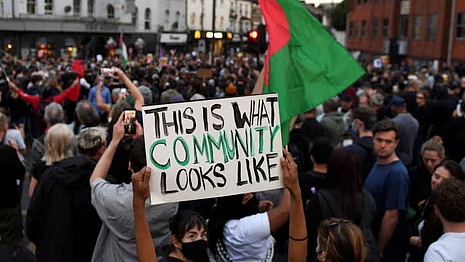Amid UK riots, religious diversity and debate — and Imran Khan
Blasphemy vs freedom of expression, Khan as Oxford chancellor, and more — in this week's London Diary

Blasphemy vs free speech
If India is serious about cracking down on attempts to throttle free speech in the name of protecting religious sensitivities, it might take a leaf out of Britain’s book.
Teachers in Britain are to be given legal protection from blasphemy claims on the grounds that ‘no religion is immune to criticism’.
Schools will be issued new statutory guidance upholding teachers’ rights to freedom of expression. Head teachers will be barred from automatically suspending staff or pupils in response to blasphemy complaints from religious groups.
The guidance will make clear that schools have no obligation to consult parents on content that may insult certain religious groups, nor do they have a duty to consult religious or community groups.
The government source said that new legal guarantees were necessary to protect teachers from intimidation or threats following a series of cases of alleged blasphemy.
These included a teacher being forced into hiding after showing pupils a cartoon of the Prophet Muhammad. He had to leave his home with his partner and children and is still living under a new identity, to protect himself and his family.
In another case last year, four boys were suspended at a school after complaints that they had slightly damaged a copy of the Quran. It led Suella Braverman, then home secretary, to introduce a code of conduct for the police to protect freedom of expression.
A senior government source said, “We do not have blasphemy laws. And we must resist any attempt to impose them on our teachers through intimidation or threats”.
The religious ‘sensitivity’ brigade in India might like to take note.
Muslim expats face the heat
Summer is finally here. But visions of long, lazy afternoons have been marred by widespread violence amid far-right protests directed against Muslim immigrants and asylum seekers.
Riots erupted in several towns, sparked by fake news about Muslims on social media platforms. Prime Minister Keir Starmer was forced to order a crackdown on groups trying to disturb the peace and community relations.
A mosque in the Southport city of Wales was attacked by activists of the white supremacist and Islamophobic English Defence League after rumours spread that a man arrested for a series of stabbings — in which three young girls were killed at a music event — was a Muslim.
As misinformation about the suspect spread online, including on X, riot police were pelted with bricks and bottles, police vans were set alight. Hundreds of people gathered outside the mosque, chanting “No surrender!” and “English ’til I die!”
The suspect turned out to be the UK-born teenage son of Rwandan immigrants.
In another incident, a group of Pakistani immigrants were involved in a violent confrontation with the police at Manchester Airport, which culminated in a police officer kicking and stomping on the head a Muslim youth.
The footage, reminiscent of incidents of police excesses against black people in America, sparked protests. With hundreds of people gathering, chants of “Shame on you!” were heard.
The full footage, however, suggested that the initial provocation came from the Pakistanis, who were upset about their mother facing harassment on a flight.
“When the flight landed, two individuals were waiting for their mum, who said there had been an issue. She pointed somebody out and there was an altercation in the Arrivals Hall,” said the Manchester mayor, Labour's Andy Burnham.
Who’s really to blame? The debate rages on.
Imran Khan as Oxford chancellor?
Imran Khan, Pakistan’s beleaguered former prime minister, is reportedly planning to apply to become the Chancellor of Oxford University, as successor to Lord Chris Patten, who will retire in autumn after more than two decades in the role.
The controversial politician and former cricketer star has been in a maximum-security prison in Pakistan, convicted of alleged treason, among other charges that he denies.
Khan’s aide Zulfi Bukhari confirmed in late July on X that 'no decision had been made' on whether he would apply, but the team had been involved in a 'series of consultations' regarding an application. Despite his clarification that an announcement would be made in 48 hours if he went ahead, no official news has been forthcoming. But speculation continues...
If he does decide to go ahead, he will be up against a number of high-profile British political figures, including William Hague, a former foreign secretary.
The chancellorship is an unpaid position. The incumbent is elected by the ‘convocation’, a body that consists of former university students, members of the governing body and retired staff.
While applicants do not have to be Oxford alumni, they do have to demonstrate outstanding achievements in their field, a deep appreciation for the university’s research and academic mission, and the ability and willingness to enhance the institution’s reputation nationally and abroad.
The successful candidate will serve a 10-year term as the university’s titular head, supporting Professor Irene Tracey, the current vice-chancellor.
The election will take place on 28 October.
------
And finally, a tongue-in-cheek notice in a bookstore in Dublin: ‘Shoplifters will be made [to] read Ulysses. If we catch you twice, it’s Finnegans Wake.’
Read more of London Diary here.
Follow us on: Facebook, Twitter, Google News, Instagram
Join our official telegram channel (@nationalherald) and stay updated with the latest headlines